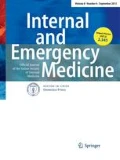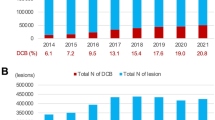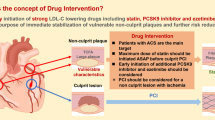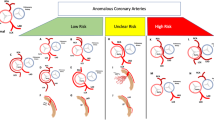Abstract
Stroke is one of the most important causes of mortality and morbidity worldwide and, for a long time, was the leading cause of death in developed countries. Atherothrombotic carotid stenosis is one of the most important etiologies behind this event. If properly recognized and treated, lives can be saved, as well as long-term disabilities prevented. With population aging and improvements in surgical and clinical care, patients with several comorbidities will be referred for revascularization procedures more frequently, posing a challenge for physicians. The purpose of this review is to provide internists and clinicians with information based on several studies so they can offer to their patients, the best evidence-based care, indicating appropriate medical therapy, as well as referral to a vascular surgeon, or what contraindicates endarterectomy or angioplasty, depending on individual characteristics.

Similar content being viewed by others
References
Thom T, Haase N, Rosamond W et al (2006) Heart disease and stroke statistics–2006 update: a report from the American Heart Association Statistics Committee and Stroke Statistics Subcommittee. Circulation 113:e85–e151
Baldwin N, Barrick J, Cloud G et al (2012) National clinical guidelines for stroke. Royal College of Physicians, UK
Rothwell PM, Coull AJ, Silver LE et al (2005) Population-based study of event-rate, incidence, case fatality, and mortality for all acute vascular events in all arterial territories (Oxford Vascular Study). Lancet 366:1773–1783
Zhang Y, Chapman AM, Plested M et al (2012) The incidence, prevalence, and mortality of stroke in France, Germany, Italy, Spain, the UK, and the US: a literature review. Stroke Res Treat 2012:436125
Go AS, Mozaffarian D, Roger VL et al (2013) Heart disease and stroke statistics–2013 update: a report from the American Heart Association. Circulation 127:e6–e245
Béjot Y, Osseby GV, Aboa-Eboulé C et al (2009) Dijon’s vanishing lead with regard to low incidence of stroke. Eur J Neurol 16:324–329
Benatru I, Rouaud O, Durier J et al (2006) Stable stroke incidence rates but improved case-fatality 06 in Dijon, France, from 1985 to 2004. Stroke 37:1674–1679
Feigin V, Lawes C, Bennett D et al (2009) Worldwide stroke incidence and early case fatality reported in 56 population-based studies: a systematic review. Lancet Neurol 8:355–369
Sacco S, Stracci F, Cerone D et al (2011) Epidemiology of stroke in Italy. Int J Stroke 6:219–227
Vega T, Zurriaga O, Ramos JM et al (2009) Stroke in Spain: epidemiologic incidence and patterns; a health sentinel network study. J Stroke Cerebrovasc Dis 18:11–16
Diaz-Guzman J, Egido J, Gabriel-Sanchez R et al (2012) Stroke and transient ischemic attack incidence rate in Spain: the IBERICTUS Study. Cerebrovasc Dis 34:272–281
Wolff T, Guirguis-Blake J, Miller T et al (2007) Screening for carotid artery stenosis: an update of the evidence for the US. Preventive Services Task Force. Ann Intern Med 147:860–870
Jacobowitz GR, Rockman CB, Gagne PJ et al (2003) A model for predicting occult carotid artery stenosis: screening is justified in a selected population. J Vasc Surg 38:705–709
Ascher E, Hingorani A, Yorkovich W et al (2001) Routine preoperative carotid duplex scanning in patients undergoing open heart surgery: is it worthwhile? Ann Vasc Surg 15:669–678
Sheiman RG, Janne d’Othée B, d’Othée BJ (2007) Screening carotid sonography before elective coronary artery bypass graft surgery: who needs it. AJR Am J Roentgenol 188:W475–W479
Durand DJ, Perler BA, Roseborough GS et al (2004) Mandatory versus selective preoperative carotid screening: a retrospective analysis. Ann Thorac Surg 78:159–166 (discussion-66)
Hillis LD, Smith PK, Anderson JL et al (2011) 2011 ACCF/AHA Guideline for Coronary Artery Bypass Graft Surgery: a report of the American College of Cardiology Foundation/American Heart Association Task Force on Practice Guidelines. Circulation 124:e652–e735
Plestis KA, Ke S, Jiang ZD et al (1999) Combined carotid endarterectomy and coronary artery bypass: immediate and long-term results. Ann Vasc Surg 13:84–92
Evagelopoulos N, Trenz MT, Beckmann A et al (2000) Simultaneous carotid endarterectomy and coronary artery bypass grafting in 313 patients. Cardiovasc Surg 8:31–40
Minami K, Fukahara K, Boethig D et al (2000) Long-term results of simultaneous carotid endarterectomy and myocardial revascularization with cardiopulmonary bypass used for both procedures. J Thorac Cardiovasc Surg 119:764–773
Char D, Cuadra S, Ricotta J et al (2002) Combined coronary artery bypass and carotid endarterectomy: long-term results. Cardiovasc Surg 10:111–115
Sara MH, Babak MD, Ali S (2009) Carotid endarterectomy for carotid stenosis in patients selected for coronary artery bypass graft surgery. Cochrane Database os Systematic Reviews 7
Wijns W, Kolh P, Danchin N et al (2010) Guidelines on myocardial revascularization. Eur Heart J 31:2501–2555
Ringleb PA, Bousser M-G, Ford G, et al (2008) Guidelines for management of ischaemic stroke and transient ischaemic attack. European Stroke Organization. Basel, Switzerland: European Stroke Organization 2008
Brott TG, Halperin JL, Abbara S et al (2011) 2011 ASA/ACCF/AHA/AANN/AANS/ACR/ASNR/CNS/SAIP/SCAI/SIR/SNIS/SVM/SVS guideline on the management of patients with extracranial carotid and vertebral artery disease. A report of the American College of Cardiology Foundation/American Heart Association Task Force on Practice Guidelines, and the American Stroke Association, American Association of Neuroscience Nurses, American Association of Neurological Surgeons, American College of Radiology, American Society of Neuroradiology, Congress of Neurological Surgeons, Society of Atherosclerosis Imaging and Prevention, Society for Cardiovascular Angiography and Interventions, Society of Interventional Radiology, Society of NeuroInterventional Surgery, Society for Vascular Medicine, and Society for Vascular Surgery. Circulation 124:e54–e130
Paliani U, Ricci S (2012) The role of statins in stroke. Intern Emerg Med 7:305–311
Durham CA, Ehlert BA, Agle SC et al (2012) Role of statin therapy and angiotensin blockade in patients with asymptomatic moderate carotid artery stenosis. Ann Vasc Surg 26:344–352
O’Regan C, Wu P, Arora P et al (2008) Statin therapy in stroke prevention: a meta-analysis involving 121,000 patients. Am J Med 121:24–33
Diener HC, Bogousslavsky J, Brass LM et al (2004) Aspirin and clopidogrel compared with clopidogrel alone after recent ischaemic stroke or transient ischaemic attack in high-risk patients (MATCH): randomised, double-blind, placebo-controlled trial. Lancet 364:331–337
Bhatt DL, Fox KA, Hacke W et al (2006) Clopidogrel and aspirin versus aspirin alone for the prevention of atherothrombotic events. N Engl J Med 354:1706–1717
Wang Y, Zhao X, Liu L et al (2013) Clopidogrel with aspirin in acute minor stroke or transient ischemic attack. N Engl J Med 369:11–19
Easton JD, Saver JL, Albers GW et al (2009) Definition and evaluation of transient ischemic attack: a scientific statement for healthcare professionals from the American Heart Association/American Stroke Association Stroke Council; Council on Cardiovascular Surgery and Anesthesia; Council on Cardiovascular Radiology and Intervention; Council on Cardiovascular Nursing; and the Interdisciplinary Council on Peripheral Vascular Disease. The American Academy of Neurology affirms the value of this statement as an educational tool for neurologists. Stroke 40:2276–2293
Squizzato A, Moja L, Ricci S et al (2012) Diagnosing acute stroke with magnetic resonance imaging (MRI) calls for caution: computed tomography (CT) is preferable for standard care. Intern Emerg Med 7:71–73
Eliasziw M, Kennedy J, Hill MD et al (2004) Early risk of stroke after a transient ischemic attack in patients with internal carotid artery disease. CMAJ 170:1105–1109
Johnston SC, Rothwell PM, Nguyen-Huynh MN et al (2007) Validation and refinement of scores to predict very early stroke risk after transient ischaemic attack. Lancet 369:283–292
Merwick A, Albers GW, Amarenco P et al (2010) Addition of brain and carotid imaging to the ABCD² score to identify patients at early risk of stroke after transient ischaemic attack: a multicentre observational study. Lancet Neurol 9:1060–1069
Rothwell PM, Giles MF, Chandratheva A et al (2007) Effect of urgent treatment of transient ischaemic attack and minor stroke on early recurrent stroke (EXPRESS study): a prospective population-based sequential comparison. Lancet 370:1432–1442
Liapis CD, Bell PR, Mikhailidis D et al (2009) ESVS guidelines. Invasive treatment for carotid stenosis: indications, techniques. Eur J Vasc Endovasc Surg 37:1–19
(1991) MRC European Carotid Surgery Trial: interim results for symptomatic patients with severe (70-99%) or with mild (0-29%) carotid stenosis. European Carotid Surgery Trialists’ Collaborative Group. Lancet 337:1235–43
(1991) Beneficial effect of carotid endarterectomy in symptomatic patients with high-grade carotid stenosis. North American Symptomatic Carotid Endarterectomy Trial Collaborators. N Engl J Med 325:445–53
Rothwell PM, Gutnikov SA, Warlow CP et al (2003) Reanalysis of the final results of the European Carotid Surgery Trial. Stroke 34:514–523
Mayberg MR, Wilson SE, Yatsu F et al (1991) Carotid endarterectomy and prevention of cerebral ischemia in symptomatic carotid stenosis. Veterans Affairs Cooperative Studies Program 309 Trialist Group. JAMA 266:3289–3294
Rothwell PM, Eliasziw M, Gutnikov SA et al (2003) Analysis of pooled data from the randomised controlled trials of endarterectomy for symptomatic carotid stenosis. Lancet 361:107–116
(1996) Endarterectomy for moderate symptomatic carotid stenosis: interim results from the MRC European Carotid Surgery Trial. Lancet 347:1591–3
(1998) Randomised trial of endarterectomy for recently symptomatic carotid stenosis: final results of the MRC European Carotid Surgery Trial (ECST). Lancet 351:1379–87
Rothwell PM, Eliasziw M, Gutnikov SA et al (2004) Endarterectomy for symptomatic carotid stenosis in relation to clinical subgroups and timing of surgery. Lancet 363:915–924
Hobson RW, Weiss DG, Fields WS et al (1993) Efficacy of carotid endarterectomy for asymptomatic carotid stenosis. The Veterans Affairs Cooperative Study Group. N Engl J Med 328:221–227
(1995) Endarterectomy for asymptomatic carotid artery stenosis. Executive Committee for the Asymptomatic Carotid Atherosclerosis Study. JAMA 273:1421–8
Halliday A, Mansfield A, Marro J et al (2004) Prevention of disabling and fatal strokes by successful carotid endarterectomy in patients without recent neurological symptoms: randomised controlled trial. Lancet 363:1491–1502
Rothwell PM, Goldstein LB (2004) (2005) Carotid endarterectomy for asymptomatic carotid stenosis: asymptomatic carotid surgery trial. Stroke 35:2425–2427
Chambers B, Donnan G. Carotid endarterectomy for carotid stenosis. Cochrane Database of Systematic Reviews 4
(2001) Endovascular versus surgical treatment in patients with carotid stenosis in the Carotid and Vertebral Artery Transluminal Angioplasty Study (CAVATAS): a randomised trial. Lancet 357:1729–37
Mas JL, Chatellier G, Beyssen B et al (2006) Endarterectomy versus stenting in patients with symptomatic severe carotid stenosis. N Engl J Med 355:1660–1671
Mas JL, Trinquart L, Leys D et al (2008) Endarterectomy versus angioplasty in patients with symptomatic severe carotid stenosis (EVA-3S) trial: results up to 4 years from a randomised, multicentre trial. Lancet Neurol 7:885–892
Ringleb PA, Allenberg J, Brückmann H et al (2006) 30 day results from the SPACE trial of stent-protected angioplasty versus carotid endarterectomy in symptomatic patients: a randomised non-inferiority trial. Lancet 368:1239–1247
Eckstein HH, Ringleb P, Allenberg JR et al (2008) Results of the stent-protected angioplasty versus carotid endarterectomy (SPACE) study to treat symptomatic stenoses at 2 years: a multinational, prospective, randomised trial. Lancet Neurol 7:893–902
Ederle J, Dobson J, Featherstone RL et al (2010) Carotid artery stenting compared with endarterectomy in patients with symptomatic carotid stenosis (International Carotid Stenting Study): an interim analysis of a randomised controlled trial. Lancet 375:985–997
Yadav JS, Wholey MH, Kuntz RE et al (2004) Protected carotid-artery stenting versus endarterectomy in high-risk patients. N Engl J Med 351:1493–1501
Gurm HS, Yadav JS, Fayad P et al (2008) Long-term results of carotid stenting versus endarterectomy in high-risk patients. N Engl J Med 358:1572–1579
Brott TG, Hobson RW, Howard G et al (2010) Stenting versus endarterectomy for treatment of carotid-artery stenosis. N Engl J Med 363:11–23
Bonati LH, Lyrer P, Ederle J et al (2012) Percutaneous transluminal balloon angioplasty and stenting for carotid artery stenosis. Cochrane Database Syst Rev 9:CD000515
Guay J (2011) Endovascular stenting or carotid endarterectomy for treatment of carotid stenosis: a meta-analysis. J Cardiothorac Vasc Anesth 25:1024–1029
Fleisher LA, Beckman JA, Brown KA et al (2007) ACC/AHA 2007 guidelines on perioperative cardiovascular evaluation and care for noncardiac surgery: a report of the American College of Cardiology/American Heart Association Task Force on Practice Guidelines (Writing Committee to Revise the 2002 Guidelines on Perioperative Cardiovascular Evaluation for Noncardiac Surgery): developed in collaboration with the American Society of Echocardiography, American Society of Nuclear Cardiology, Heart Rhythm Society, Society of Cardiovascular Anesthesiologists, Society for Cardiovascular Angiography and Interventions, Society for Vascular Medicine and Biology, and Society for Vascular Surgery. Circulation 116:e418–e499
Poldermans D, Bax JJ, Boersma E et al (2009) Guidelines for pre-operative cardiac risk assessment and perioperative cardiac management in non-cardiac surgery. Eur Heart J 30:2769–2812
Gualandro DM, Yu PC, Calderaro D et al (2011) II Guidelines for perioperative evaluation of the Brazilian Society of Cardiology. Arq Bras Cardiol 96:1–68
Bertges DJ, Goodney PP, Zhao Y et al (2010) The Vascular Study Group of New England Cardiac Risk Index (VSG-CRI) predicts cardiac complications more accurately than the Revised Cardiac Risk Index in vascular surgery patients. J Vasc Surg 52:674–683 83.e1-83.e3
Oscarsson A, Gupta A, Fredrikson M et al (2010) To continue or discontinue aspirin in the perioperative period: a randomized, controlled clinical trial. Br J Anaesth 104:305–312
Lindblad B, Persson NH, Takolander R et al (1993) Does low-dose acetylsalicylic acid prevent stroke after carotid surgery? A double-blind, placebo-controlled randomized trial. Stroke 24:1125–1128
Gerstein NS, Schulman PM, Gerstein WH et al (2012) Should more patients continue aspirin therapy perioperatively?: clinical impact of aspirin withdrawal syndrome. Ann Surg 255:811–819
Taylor DW, Barnett HJ, Haynes RB et al (1999) Low-dose and high-dose acetylsalicylic acid for patients undergoing carotid endarterectomy: a randomised controlled trial. ASA and Carotid Endarterectomy (ACE) Trial Collaborators. Lancet 353:2179–2184
Chechik O, Goldstein Y, Behrbalk E et al (2012) Blood loss and complications following carotid endarterectomy in patients treated with clopidogrel. Vascular 20:193–197
de Borst GJ, Hilgevoord AA, de Vries JP et al (2007) Influence of antiplatelet therapy on cerebral micro-emboli after carotid endarterectomy using postoperative transcranial Doppler monitoring. Eur J Vasc Endovasc Surg 34:135–142
Payne DA, Jones CI, Hayes PD et al (2004) Beneficial effects of clopidogrel combined with aspirin in reducing cerebral emboli in patients undergoing carotid endarterectomy. Circulation 109:1476–1481
Durazzo AES, Machado FS, Ikeoka DT et al (2004) Reduction in cardiovascular events after vascular surgery with atorvastatin: a randomized trial. J Vasc Surg 39:967–975
Schouten O, Hoeks SE, Welten GM et al (2007) Effect of statin withdrawal on frequency of cardiac events after vascular surgery. Am J Cardiol 100:316–320
Schouten O, Boersma E, Hoeks SE et al (2009) Fluvastatin and perioperative events in patients undergoing vascular surgery. N Engl J Med 361:980–989
McGirt MJ, Perler BA, Brooke BS et al (2005) 3-hydroxy-3-methylglutaryl coenzyme A reductase inhibitors reduce the risk of perioperative stroke and mortality after carotid endarterectomy. J Vasc Surg 42:829–836 (discussion 36–7)
Gröschel K, Ernemann U, Schulz JB et al (2006) Statin therapy at carotid angioplasty and stent placement: effect on procedure-related stroke, myocardial infarction, and death. Radiology 240:145–151
McKevitt FM, Sivaguru A, Venables GS et al (2003) Effect of treatment of carotid artery stenosis on blood pressure: a comparison of hemodynamic disturbances after carotid endarterectomy and endovascular treatment. Stroke 34:2576–2581
Krutman M, Calderaro D, Casella IB et al (2012) Sinus bradycardia persisting for 9 days after carotid angioplasty and stenting. Arq Bras Cardiol 99:e134–e136
Qureshi AI, Luft AR, Sharma M et al (1999) Frequency and determinants of postprocedural hemodynamic instability after carotid angioplasty and stenting. Stroke 30:2086–2093
Gupta R, Abou-Chebl A, Bajzer CT et al (2006) Rate, predictors, and consequences of hemodynamic depression after carotid artery stenting. J Am Coll Cardiol 47:1538–1543
Cayne NS, Faries PL, Trocciola SM et al (2005) Carotid angioplasty and stent-induced bradycardia and hypotension: impact of prophylactic atropine administration and prior carotid endarterectomy. J Vasc Surg 41:956–961
Davis SM, Donnan GA (2012) Carotid-artery stenting in stroke prevention. N Engl J Med 363:80–82
Amarenco P, Bogousslavsky J, Callahan A et al (2006) High-dose atorvastatin after stroke or transient ischemic attack. N Engl J Med 355:549–559
Guay J, Ochroch EA (2012) Carotid endarterectomy plus medical therapy or medical therapy alone for carotid artery stenosis in symptomatic or asymptomatic patients: a meta-analysis. J Cardiothorac Vasc Anesth 26:835–844
Bond R, Rerkasem K, Cuffe R et al (2005) A systematic review of the associations between age and sex and the operative risks of carotid endarterectomy. Cerebrovasc Dis 20:69–77
Howard VJ, Voeks JH, Lutsep HL et al (2009) Does sex matter? Thirty-day stroke and death rates after carotid artery stenting in women versus men: results from the Carotid Revascularization Endarterectomy versus Stenting Trial (CREST) lead-in phase. Stroke 40:1140–1147
Carmo GA, Calderaro D, Yu PC et al (2012) Perioperative cardiovascular evaluation: heads or tails? Rev Assoc Med Bras 58:505–512
Gualandro DM, Campos CA, Calderaro D et al (2012) Coronary plaque rupture in patients with myocardial infarction after noncardiac surgery: frequent and dangerous. Atherosclerosis 222:191–195
Conflict of interest
None.
Author information
Authors and Affiliations
Corresponding author
Rights and permissions
About this article
Cite this article
Carmo, G.A.L., Calderaro, D., Gualandro, D.M. et al. Carotid stenosis management: a review for the internist. Intern Emerg Med 9, 133–142 (2014). https://doi.org/10.1007/s11739-013-1005-z
Received:
Accepted:
Published:
Issue Date:
DOI: https://doi.org/10.1007/s11739-013-1005-z




